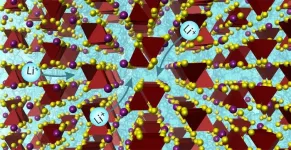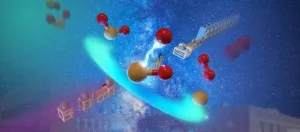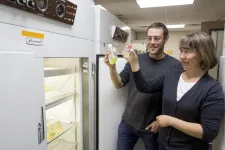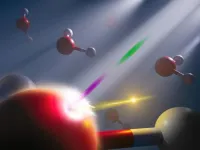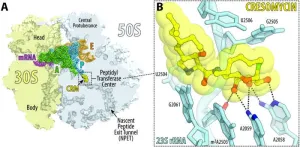Study: Ablative stereotactic magnetic resonance-guided adaptive radiation therapy may improve overall survival in patients with pancreatic cancer
2024-02-15
(Press-News.org) MIAMI, FL – February 15, 2024 – A study co-led by researchers at Miami Cancer Institute, part of Baptist Health South Florida, found that ablative stereotactic magnetic resonance (MR)-guided adaptive radiation therapy may improve local control (LC) and overall survival (OS) in patients with borderline resectable (BRPC) and locally advanced pancreas cancer (LAPC). Long-term outcomes from the Phase 2 SMART trial demonstrate encouraging OS and limited toxicity as published recently in Radiotherapy & Oncology (“The Green Journal”).
“Pancreatic ductal adenocarcinoma is a leading cause of cancer death. Surgery is the only known curative treatment, although most newly diagnosed patients are not surgical candidates due to locally extensive and/or distant metastatic disease,” said Michael D. Chuong, M.D., vice chair and medical director of proton therapy and photon therapy in the department of radiation oncology at Miami Cancer Institute, and senior author of the study. “Ablative radiation therapy may benefit patients with advanced pancreatic ductal adenocarcinoma by improving LC, reducing pain, and enhancing quality-of-life.”
This first prospective, multi-center, single-arm open-label Phase 2 trial enrolled 136 patients at thirteen centers in three countries after ≥3 months of any chemotherapy without distant progression and a serum carbohydrate antigen (CA 19-9) tumor marker level of £500 U/mL. Stereotactic magnetic resonance (MR)-guided adaptive radiation therapy (SMART) was delivered on a 0.35T MR-guided system prescribed to 50 Gy in 5 fractions. Surgery and chemotherapy were permitted after SMART. Median OS from diagnosis and SMART was 22.8 months and 14.2 months, respectively. Two-year OS for the entire cohort from diagnosis and SMART was 53.6 % and 40.5 %, respectively, which is significantly higher than what is expected after chemotherapy +/- standard radiation therapy. Two-year estimated OS for resected vs. unresected patients from SMART was 67 % vs. 26 % respectively. Two-year LC from diagnosis and SMART for the entire cohort was 77.7 % and 78.2 %, respectively, and was higher for resected vs. unresected patients (90 % vs. 71 %; p = 0.019).
“The SMART trial is the first to prospectively demonstrate the safety of delivering ablative radiation dose for advanced pancreas cancer, which resulted in excellent long-term LC even among patients who did not have surgery,” added Dr. Chuong. “We are especially excited by the potential for ablative radiation therapy to also prolong OS. A Phase 3 randomized trial evaluating whether OS is definitely improved with addition of ablative SMART to chemotherapy versus chemotherapy alone for advanced pancreas cancer is warranted,” said Dr. Chuong.
About Miami Cancer Institute
Miami Cancer Institute brings to South Florida access to personalized clinical treatments and comprehensive support services delivered with unparalleled compassion. No other cancer program in the region has the combination of cancer-fighting expertise and advanced technology—including the first proton therapy center in South Florida, Latin America and the Caribbean, and one of the only radiation oncology programs in the world with each of the newest radiation therapies in one place—to diagnose and deliver precise cancer treatments that achieve the best outcomes and improve the lives of cancer patients. The Institute offers an impressive roster of established community oncologists and renowned experts, clinical researchers and genomic scientists recruited from the nation’s top cancer centers. Selected as Florida’s only member of the Memorial Sloan Kettering Cancer (MSK) Alliance, Miami Cancer Institute is part of a meaningful clinical collaboration that affords patients in South Florida access to innovative treatments and ensures that the standards of care developed by their multidisciplinary disease management teams match those at MSK. For more information, please visit https://cancer.baptisthealth.net/miami-cancer-institute.
Miami Cancer Institute is part of Baptist Health Cancer Care, the largest cancer program in South Florida, with locations from the Florida Keys to the Palm Beaches.
###
END
ELSE PRESS RELEASES FROM THIS DATE:
2024-02-15
One of the grand challenges for materials science is the design and discovery of new materials that address global priorities such as Net Zero.
In a paper published in the journal Science, researchers at the University of Liverpool have discovered a solid material that rapidly conducts lithium ions. Such lithium electrolytes are essential components in the rechargeable batteries that power electric vehicles and many electronic devices.
Consisting of non-toxic earth-abundant elements, the new material has high ...
2024-02-15
Why do Serengeti zebra, wildebeest, and gazelle – all sharing limited food resources – follow the same migratory routes, one after another, in a body-size dependent way? This longstanding question has now been evaluated by researchers who used novel data to show how a balance of species interactions and ecological factors regulate this process. They say competition pushes zebra ahead of the wildebeest, and wildebeest then eat plants in a way that facilitates development of newer growth the trailing gazelle like. “Our results highlight a balance between facilitative and competitive forces,” the authors say. Large seasonal migrations are a ...
2024-02-15
Oxygenation in the tropical North Pacific Ocean increased during a warm climatic interval that occurred roughly 56 million years ago, despite high global temperatures, according to a new study. Its findings offer insights into how modern tropical oceans may respond to ongoing anthropogenic climate warming. The availability and distribution of dissolved oxygen in Earth’s oceans play a fundamental role in supporting marine ecosystems and marine life. However, oxygen in the global oceans is declining in response to anthropogenic warming. Although these trends writ large are predicted to continue, the future of oxygen in the highly productive ...
2024-02-15
Cresomycin – a novel synthetic molecule – demonstrates remarkably robust efficacy against multiple, evolutionary divergent forms of antimicrobial resistance (AMR), researchers report. The emergence and widespread distribution of bacteria broadly resistant to approved antibiotics raises serious global public health concerns. Given the growing rate of deaths attributable to antimicrobial resistance (AMR) worldwide, it’s evident the pace of discovery and development of antibiotics effective against AMR has not kept up with the need. Many small ...
2024-02-15
For his work in furthering the understanding of how the human immune system senses dangerous invading pathogens, Bingxu Li has received the 2024 Michelson Philanthropies & Science Prize for Immunology. Li’s prize-winning essay investigates the role that Stimulator of Interferon Genes, or STING, plays in including multiple distinct defenses against viruses, bacteria, and tumors and in orchestrating myriad downstream responses upon activation – resolving a significant mystery in the field of innate immunity. The sensing and clearance of invading pathogens ...
2024-02-15
Scientists have observed so-called 'roaming' chemical reactions, those that at certain points move away from the lowest minimum energy 'path of least resistance', in highly excited energy states for the first time.
Chemical reactions are supposed to occur along their minimum energy paths. In recent years, so-called roaming reactions that stray far from this path have begun to be observed, but only for chemical species in their ground state or, at most, their first excited state. However, researchers have now observed a roaming reaction even in highly excited energy states.
The researchers ...
2024-02-15
Researchers at Michigan State University and the Carnegie Institution for Science have developed a model that connects microscopic biology to macroscopic ecology, which could deepen our understanding of nature’s laws and create new opportunities in ecosystem management.
Reporting in the journal Science on Feb. 16, the team showed how microscopic relationships in plankton — such as between an organism’s size and nutrient consumption — scales up to predictably affect food webs.
“Using data that other researchers have measured at the microscale about these organisms, our model can predict what’s happening at the scale of whole ecosystems,” said Jonas ...
2024-02-15
RICHLAND, Wash.—In an experiment akin to stop-motion photography, scientists have isolated the energetic movement of an electron while “freezing” the motion of the much larger atom it orbits in a sample of liquid water.
The findings, reported today in the journal Science, provide a new window into the electronic structure of molecules in the liquid phase on a timescale previously unattainable with X-rays. The new technique reveals the immediate electronic response when a target is hit with an X-ray, an important step in understanding the effects of radiation exposure on objects and people.
“The chemical reactions induced by radiation ...
2024-02-15
A new antibiotic created by Harvard researchers overcomes antimicrobial resistance mechanisms that have rendered many modern drugs ineffective and are driving a global public health crisis.
A team led by Andrew Myers, Amory Houghton Professor of Chemistry and Chemical Biology, reports in Science that their synthetic compound, cresomycin, kills many strains of drug-resistant bacteria, including Staphylococcus aureus and Pseudomonas aeruginosa.
“While we don’t yet know whether cresomycin and drugs like it are safe ...
2024-02-15
CAMBRIDGE, MA — A simple technique that uses small amounts of energy could boost the efficiency of some key chemical processing reactions, by up to a factor of 100,000, MIT researchers report. These reactions are at the heart of petrochemical processing, pharmaceutical manufacturing, and many other industrial chemical processes.
The surprising findings are reported today in the journal Science, in a paper by MIT graduate student Karl Westendorff, professors Yogesh Surendranath and Yuriy Roman-Leshkov, and two others.
“The results are really striking,” says Surendranath, a professor of chemistry ...
LAST 30 PRESS RELEASES:
[Press-News.org] Study: Ablative stereotactic magnetic resonance-guided adaptive radiation therapy may improve overall survival in patients with pancreatic cancer
